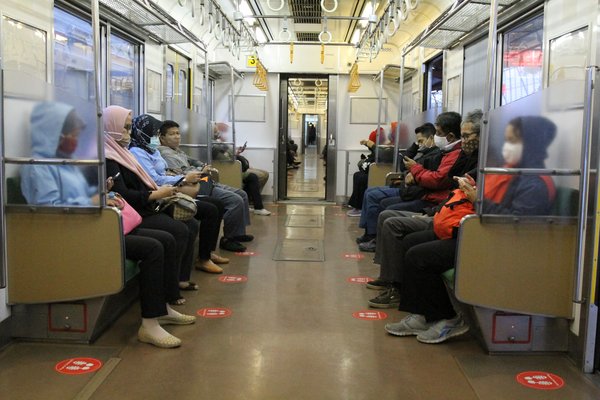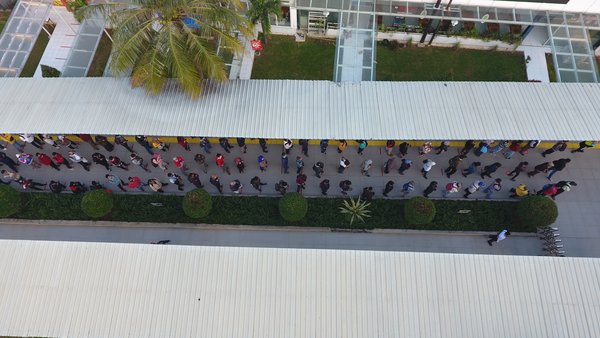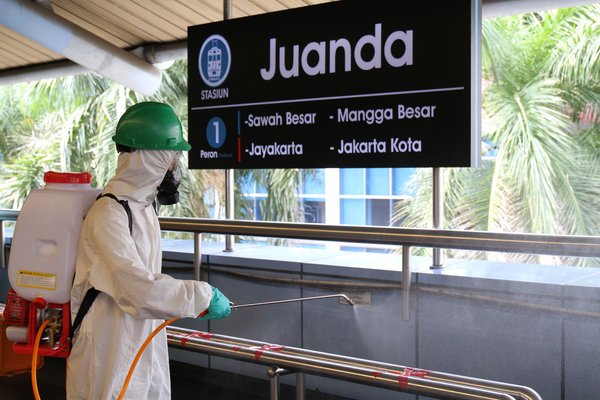KCI Plays an Important Role in Changing Public Transport Culture During COVID-19 Pandemic
by Theleaders-Online | August 4, 2020 10:32 am
JAKARTA, Indonesia, Aug. 4, 2020 /PRNewswire/ — PT Kereta Commuter Indonesia (KCI), the operator for Commuter Line trains in Indonesia, is leading a cultural change in public transport during this COVID-19 global pandemic. As Indonesia transitions into new normal, KCI is providing a Commuter Line service that prioritize health protocols for the citizens of Jakarta and its surrounding cities.
 [1]
[1]Passengers Sits Inside A Train equipped with markers. Before the pandemic, trains were often packed. Now regulations limit the number of passengers to 74 people in each car in order to ensure physical distancing.
 [2]
[2]Commuter Line Passengers Queueing In Bogor Station As KCI Limit Train Capacity To Avoid Overcrowding
 [3]
[3]Worker Sprays Disinfection Liquid on Stations and Trains Daily.
Jakarta is a metropolis with almost 11 million inhabitants. The capital city of Indonesia is surrounded by smaller cities such as Bogor, Depok, Bekasi, and Tangerang where most of the workers in Jakarta resides. An efficient transport system capable of serving millions of people is vital for their mobility. Before the COVID-19 Pandemic, Commuter Line serves 1 million passengers per day. But during this pandemic when Jakarta and other regions have Large-scale Social Restriction policy in place, only 20% of that number remained. Now as Indonesia is entering transition period for new normal, Commuter Line accomodates around 380.000 passengers daily.
Indonesian Government and KCI enforce strict health protocols on stations and inside the trains. In normal condition, passengers can board the commuter train without any restrictions. But since this COVID-19 pandemic, everyone is required to have their body temperature checked before entering the station, wear a mask at all times, and refrain from talking. Children under the age of five are not allowed to use the train, whereas people at sixty years old or older can board the train only during off-peak hours. KCI also provides medical post in its busiest stations equipped with temporary isolation room. The company even installed hundreds of extra washbasin in all of its 80 stations to encourage passengers to wash their hands more often.
“But the most unique health protocol for us in the public transport sector is limiting the number of our passengers. In line with government regulation, currently we can only accomodate 74 passenger per car to maintain safe physical distance inside our trains. Applying this policy is a massive cultural change both for us and our passengers,” said Wiwik Widayanti KCI’s President Director.
To limit the amount of people allowed into the platforms and ultimately into the train, KCI filters its passengers through several zones of queueing especially on crowded stations during peak-hours. In Bogor, a Station with the highest volume of passenger, queueing are separated into four zones. Anyone who wanted to board the train have to go through these zones. To prevent complaint about long queueing lines, passengers can see real time condition in the station through social media and KCI’s KRL Access apps. Providing this information through the app is also a way to change the culture of passengers. Now they are encouraged to make informed decision and plan their trip before heading to the train station.
Sandi Adri, a daily train user from Depok to Jakarta, experienced this policy first hand. “I have to queue patiently in the station. But inside the train, it is never packed. I can mantain safe physical distance with other passengers during my trip,” Sandi explained.
So far most of the passengers can adapt to various health protocols from KCI. “I understand that these protocols are applied to ensure everyone is healthy and safe,” said Tresita Aprilia who uses Commuter Line daily from Jakarta to Tangerang.
This is not the first time KCI has played an important role in changing the culture of transportation in Indonesia. Previously in 2013, KCI also changed the culture of its passengers by introducing an electronic ticketing system to a society who for decades were used to not paying and ignorant when using the Commuter Line.
-Commuter Line Best Choice for Urban Transport-
For further information please contact: Adli Hakim, External Relations and Public Image Care Manager, phone: +628561462922. e-mail: corcom.kci@krl.co.id . More photo documentation is available on: https://bit.ly/KCI-Pandemic
Photo – https://photos.prnasia.com/prnh/20200804/2875704-1-a?lang=0
Photo – https://photos.prnasia.com/prnh/20200804/2875704-1-b?lang=0
Photo – https://photos.prnasia.com/prnh/20200804/2875704-1-c?lang=0
- [Image]: https://photos.prnasia.com/prnh/20200804/2875704-1-a?lang=0
- [Image]: https://photos.prnasia.com/prnh/20200804/2875704-1-b?lang=0
- [Image]: https://photos.prnasia.com/prnh/20200804/2875704-1-c?lang=0
Source URL: https://theleaders-online.com/kci-plays-an-important-role-in-changing-public-transport-culture-during-covid-19-pandemic/